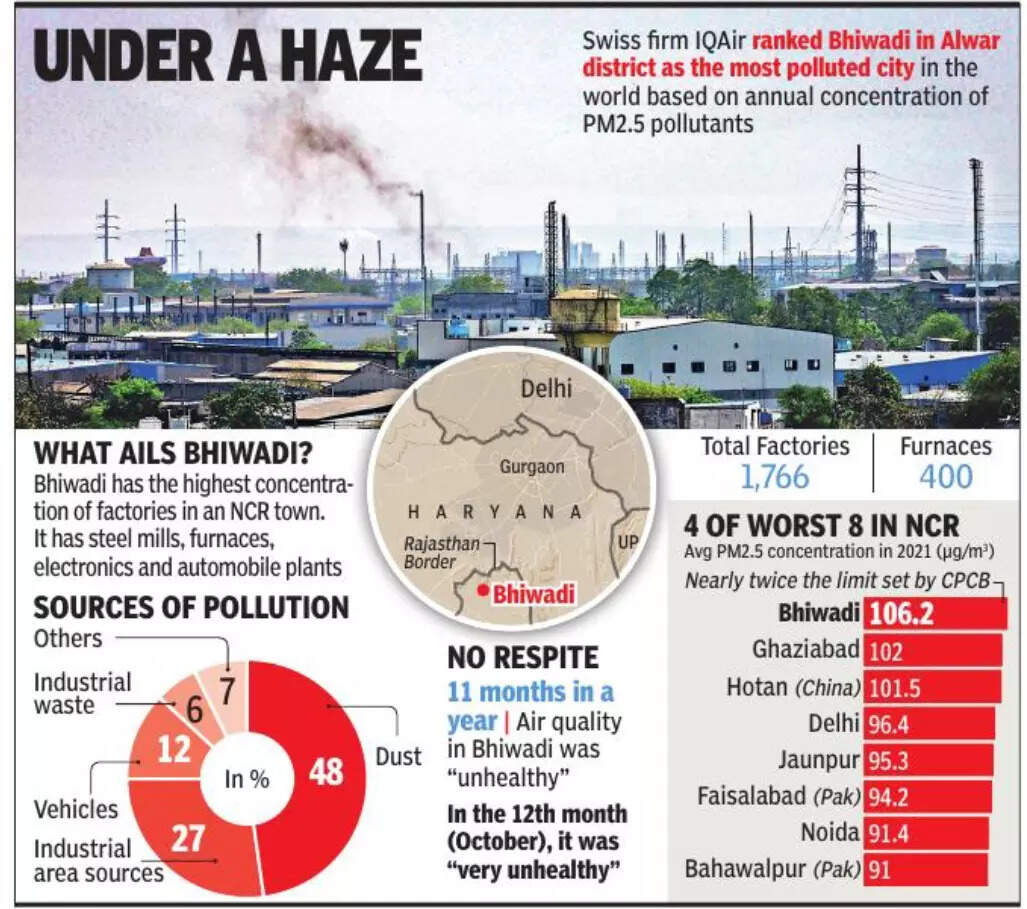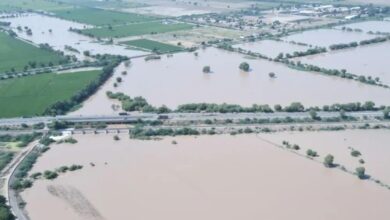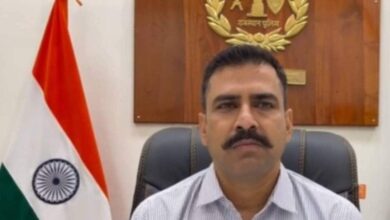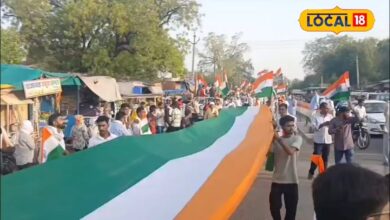Bhiwadi: Breathing the world’s worst air
Not long ago, builders sold this city in Rajasthan’s Alwar district as a tranquil, unpolluted residential destination, but today it wears a different crown. In March, Swiss firm IQAir labelled it the most polluted city in the world based on the concentration of ultrafine particles (PM2. 5) in its air.

Bhiwadi’s average PM2. 5 level through 2021 was 106. 2 µg/m3 when Delhi, the world’s most polluted capital, averaged 96. 4 µg/m3. In Bhiwadi – also called the gateway to Rajasthan – coarse dust is everywhere, from trees to street signage, house windows and parked cars, but the high concentration of PM2. 5 is down to local emissions.
The city has 1,766 industrial units and 400 large furnaces – the largest concentration of manufacturing units in the National Capital Region. An IIT Kanpur study published in 2020 says the 400 furnaces are big polluters “due to the use of coal, wood, and other solid fuels. ”
The study unsurprisingly found dust (48%) to be the biggest air pollutant in Bhiwadi, but industrial sources (27%) and industrial waste (6%) together made the problem severe. Vehicles accounted for 12% of the emissions, and garbage burning also raised overall levels.
An industrial problem
Bhiwadi’s proximity to Gurgaon, Faridabad and Delhi, and location on the DelhiJaipur highway attracted industries. The city now has three major designated industrial area s – Bhiwadi Industrial Area, Chopanki and Khuskhera. BIA, which has many metal fabrication, chemical, plastic, food processing and rubber goods factories, contributes 65% of the industrial pollution load, found the Centre for Science and Environment (CSE).
Sandeep Yadav, the Congress MLA from Tijara constituency in Alwar district, said, “On industrial pollution, I raised the question twice in the Assembly but never got a satisfactory answer. I will raise the issue once again in the House. ”
Missing green lung
The IIT study found only a 2 sqkm area in Bhiwadi could be called ‘green’, based on land use. “The city needs a plan to improve its green cover, which can act as a buffer for the dust,” said Koyel Kejriwal, who moved to the city two years ago with her husband, an IT firm employee in Gurgaon. She does not go out during the day and her husband wears a mask while travelling, not just due to Covid. “We have air purifiers indoors, and we don’t let children play outside,” she said.
Some of the pollutions can be addressed by repaving broken roads that slow down traffic and ensuring orderly parking. Pollution department officials said 60% of Bhiwadi’s roads face the issue of haphazard parking.
Bhiwadi’s industrial prosperity has also meant round the-year construction, especially along Alwar bypass road and the UTI residential area. “Walking for even five minutes in these areas may make you cough,” said Janvi, who lives in Sector 38 that has new housing projects.
The smokey air around the industrial areas turns acrid whenever the waste dumped outside factories is burnt. “My brother had severe breathing problems when he worked at the stall,” said Akhil Singh, who has a tea stall opposite a factory in Chopanki.
Alwar’s chief medical officer Dr O P Meena said cases of cough, respiratory distress, eye and skin problems, bronchitis, etc. increase in winter.
“High density of industries and emissions make Bhiwadi residents prone to such diseases. ” People who bought into Bhiwadi’s housing story can’t regret their choice enough. “ It’s not easy to move out of a place because of its air quality index. We can’t move to some other city. We have a house here,” said Megha Agarwal, who lives on Beri Road.
Clean fuel only way out
Experts told TOI converting industries to clean fuel should be the priority. “There is a need to promote and mandate cleaner fuels. Industries need to be shifted to natural gas and electricity,” said Anumita Roychowdhury, executive director (research and advocacy) at CSE. But Vijay Singhal, chief environment engineer of the Rajasthan State Pollution Control Board, said the process will take time. “We are planning to get all industries to switch to piped natural gas (PNG). ”
Setting up a landfill, upping the green cover, and parking regulations, too, are part of the pollution action plan.
“We’re monitoring garbage burning and conducting plantation drives. Road repairs are also planned,” said Vivek Goel, the pollution board’s regional officer.




